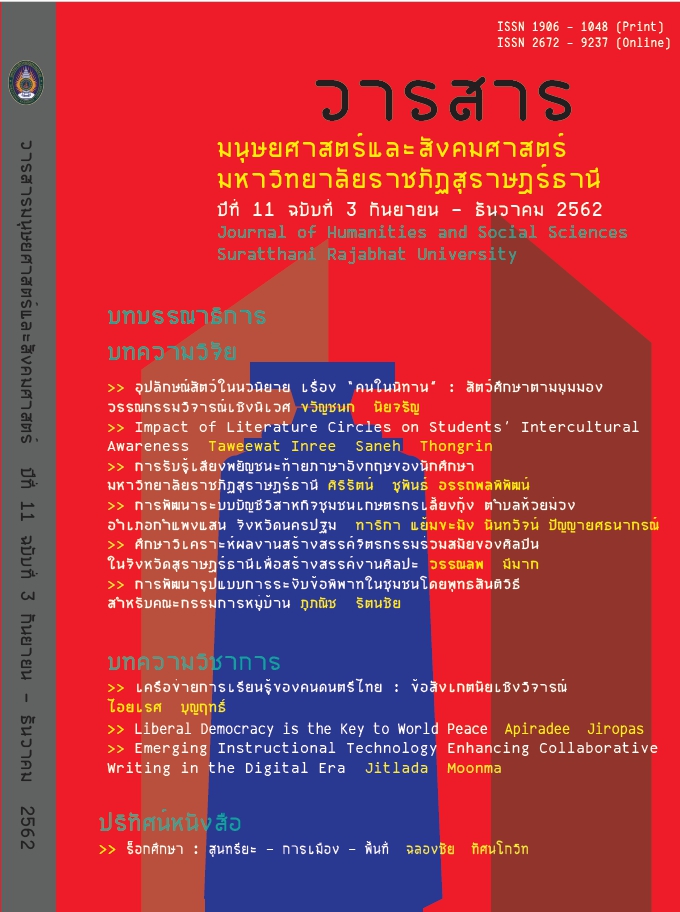The learning network of Thai musicians: The critical implication
Main Article Content
Abstract
This academic article explores and observes "Thai musicians" in the interrelated relationships within the Thai music culture. The study considers the relationships between individuals, groups of people and / or institutions that express both formal and informal oral tradition which encourages knowledge and critical opinions. This article notes the various networks of Thai musicians, including 1) the Learning institute of Thai music (home-temple-palace) network, 2) the music social network, 3) the Thai music network on the virtual world and 4) Academic network of Thai music. The networks led to the consideration of the critical implications of the
music culture. The study of the Thai music network with criticism lead to the interpretation to understand various kinds of interaction that building a learning network in 3 characteristics which are 1) Network from culture (By Culture), 2) Network arising from the common goal (By Design) and 3) Networks occur in a particular situation (By Crisis)
Article Details

This work is licensed under a Creative Commons Attribution-NonCommercial-NoDerivatives 4.0 International License.
All published manuscripts have been verified by peer-peer professors in the fields of humanities and social sciences. Reprinting of the article must be authorized by the editorial staff.
References
Chetana nagavajara. (2002). The theory of homeland. Bangkok: the journal of cultural research, Srinakarinwirot university, 3(2). (In Thai)
Chetana nagavajara. (2003). Sil Song Tang (A comparative study of contemporary British, American, Thai, French and German poetry). Bangkok:Kombang publishing. (In Thai)
Chetana nagavajara. (2006). From Art to Criticism. Bangkok: Amarin Printing Publishing. (In Thai)
Iyared Boonyarit. (2010). Thai classical Music community in Cyber Space: A case study of webboard in Http://www.thaikids.com. Research institute for Languages and Cultures of Asia, Mahidol University. (In Thai)
Loung Praditpiroh Foundation. (2006). Ngan Chang for Thailand: the 100th of CHIN lady. Bangkok: Pinklaw publishing. (In Thai)
Montri Tramote. (1997). Theory of Thai Classical Music. Bangkok: Matichon. (In Thai)
Narongchai Pidokrat. (2000). Thai Music Homage Ceremony. Journal of Humanites and Social science, Ratjaphat Suratthani University.
(2).55-76. (In Thai)
Panya Rungreang. (1974). History of Thai Classical Music. Bangkok: Thaiwattanapanich publishing. (In Thai)
Pisan Intawong. (2004). Commemorative book of the 33rd Thai Classical music aggregation. Bangkok: Ramkamhang University. (In Thai)
Poonpit Amatayakul. (1980). Neaw Duriyaphan: The best Thai singer of The nation. Thai culture magazine. (In Thai)
Poonpit Amatayakul. (1986). Music Appreciation. Bangkok: Siamsamai company publishing. (In Thai)
Poonpit Amatayakul. (1991). Thai Classical music. Bangkok: Reankaew publishing. (In Thai)
Poonpit Amatayakul. (2007). Music Archive of 5 Regien. The documentation Research in 1868-2006. Bangkok: Loung Praditpiroh Foundation. (In Thai)
Rangsiphan Khengkhan. (2004). The synthesis and Thesis of Music: Research project of the criticism as an intellectual power in contemporary society. Bangkok: Pabpim publishing. (In Thai)
Sangobseuk Dhammavihan. (1999). The theory of Thai Classical Music. Bangkok: Chulalongkorn University Printing House. (In Thai)
Suppachai Chansuwan. (1994). An analysis of King Rama VI's thoughts on and his role in the dramatic and music educational enhancement: a case study of the Phranluang School under the royal patronage. Faculty of Education, Chulalongkorn University. (In Thai)
Interviews
Chetana Nagavajara (Interviewee) Iyared Boonyarit (Interviewer). At Princess Maha Chakri Sirindhorn Anthropology Centre (Public Organisation), Bangkok. On 12nd October 2018.
Vatit Duriyaungkul (Interviewee) Iyared Boonyarit (Interviwer). At Research Institute for Languages and Cultures of Asia, Mahidol University, Nakornpathom Provice. On 2nd February 2015.


